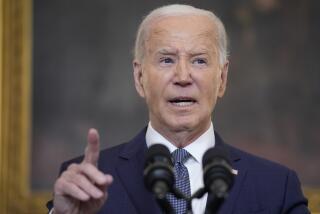S. Africa Offers Timetable for Namibia Exit
- Share via
JOHANNESBURG, South Africa — The South African government, proposing the first timetable for peace in southwestern Africa, called Tuesday for a cease-fire next week in Angola’s 13-year-old civil war and offered to begin pulling out of Namibia on Nov. 1 and to allow free elections there by June.
Foreign Minister Roelof (Pik) Botha, at a news conference in the capital of Pretoria, said the proposals were made in Geneva at the resumption of U.S.-mediated Angolan peace negotiations involving South Africa, Angola and Cuba.
Withdrawal of Cubans
The South African overture includes several important conditions, among them the withdrawal of the more than 50,000 Cuban troops stationed in Angola by next June 1 and the removal of seven military camps run by the African National Congress.
The outlawed ANC is the principal rebel group fighting to end South Africa’s white-minority rule.
“If these proposals are accepted . . . there will indeed be no losers, and all nations of southern Africa can only gain,” Botha said. “Peace will have been restored, and the road will be open for social and economic development in the region.”
Botha announced his government’s offer despite an agreement by participants at the talks in Geneva, which opened Tuesday, to abide by a strict news blackout. Representatives of Cuba and Angola were studying the South African plan and declined to comment.
Under Pretoria’s timetable, South Africa would completely withdraw its forces from Angola by Sept. 1, after a cease-fire beginning next Wednesday.
An estimated 3,000 South African troops currently fight alongside the Union for the Total Independence of Angola (UNITA), a rightist rebel group led by Jonas Savimbi and substantially supported by the CIA.
At War Since 1975
Savimbi’s group has been at war with Angola’s Marxist government, which is supported by a large deployment of Cuban troops, since Portugal pulled out of the country in 1975.
Senior American officials say they hope an Angolan settlement eventually would include Savimbi in a government of national unity. Savimbi is not a participant in the current talks, but he has expressed his support for the negotiations as well as his willingness to one day participate in a coalition government in Angola.
The timetable for the departure of Cuban troops from Angola has been a key point of disagreement in the negotiations.
Angola has previously supported a four-year withdrawal of Cuban forces, while South Africa has pushed consistently for a more rapid pullout.
Soviets Support Initiative
Bringing all the Cuban troops home so quickly, especially with Cuba’s weak economy, could create political problems for Fidel Castro, American officials have said. But Angola and Cuba also are under Soviet pressure to reach agreement with South Africa. The Soviet Union supports the peace initiative.
South Africa’s proposals Tuesday marked the first time that Pretoria has mentioned a firm date for implementing a 1978 U.N. resolution calling for independence in Namibia.
Mineral-rich Namibia, bordered by Angola to the north and South Africa to the south and east, has been ruled for 73 years by South Africa.
South Africa has refused to say how many of its troops are stationed in Namibia, but it has been estimated that the figure is at least 25,000. Those forces are fighting the military arm of the South-West African People’s Organization, a rebel group operating in northern Namibia with bases in southern Angola.
20,000 Killed in War
SWAPO has been fighting a 22-year-long bush war for independence against South Africa-led troops. That war has claimed more than 20,000 lives.
Since 1985, Namibia has been governed by a transitional, multi-racial body, installed by South Africa, which includes representatives of SWAPO. Many analysts in the region believe SWAPO would run the country if free elections were held.
Namibian independence has been a highly volatile issue within South Africa. Pretoria’s ruling National Party already has come under fire from the far-right Conservative Party, whose strength has been growing in recent months, for “giving away” Namibia and selling out the white farmers there who remain loyal to white minority rule.
At a round of talks last month, Angola, Cuba and South Africa agreed on 14 principles for settling the Angolan civil war and granting Namibia its independence.
More to Read
Sign up for Essential California
The most important California stories and recommendations in your inbox every morning.
You may occasionally receive promotional content from the Los Angeles Times.














